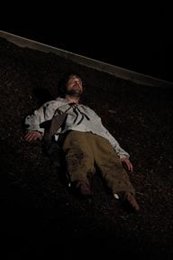One benefit of adapting literary classics for theatre is that their core issues can be presented in snappy fashion to digital-age audiences who may forever have lost the habit of patiently traversing bulky nineteenth-century novels for their leisurely edification. Patsy Hughes’ lean distillation of Mary Shelley’s Frankenstein is, in that respect, an intense experience, cutting to the quick in its short, sharp focus on the rawly existential questions raised in Shelley’s Gothic masterpiece.
 Dividing the intimate performing area of the Brian Friel Theatre down the middle, Hughes sites the monster-making Victor Frankenstein stage-right, where he is already intently perusing a map when the audience enters. His study, with a spartan school-desk at its centre, is piled with dusty academic tomes and bits of human skeleton, symbolic remnants of the young student’s fateful obsession with the creation of animate existence.
Dividing the intimate performing area of the Brian Friel Theatre down the middle, Hughes sites the monster-making Victor Frankenstein stage-right, where he is already intently perusing a map when the audience enters. His study, with a spartan school-desk at its centre, is piled with dusty academic tomes and bits of human skeleton, symbolic remnants of the young student’s fateful obsession with the creation of animate existence.
“Whence did the principle of life proceed?” That’s the question Frankenstein obsesses over, but the deeper issue is why he is so relentlessly driven to ask it. We sense in the carefully measured intimations of Colin Ash’s performance an individual propelled by something in him which he simply has no access to, or control over. We get glimpses too of Frankenstein’s claustrophobically idealised relationship with his adoptive cousin Elizabeth, whom he eventually marries.
Sensitively as Ash depicts the troubled character of Victor in his soliloquies, it is when focus switches to the steel-rimmed pit of wood shavings and rotting foliage stage-left that the dramatic temperature really rises. It’s the habitat of the monster which Frankenstein created: initially spot-lit in a bag, the man-gone-wrong gradually emerges like some festering pupa in eclosion.
 Though Conor Maguire is wild and hirsute in appearance, there’s no attempt to make him visibly deformed or grotesquely ugly. That’s probably a good thing: it helps focus attention on the extraordinarily anarchic thoughts voiced by the monster, the desperate nexus of desires and longings which lacerate his experience of everyday existence. “Cursed creator! Why did I live?” he agonises at one point, momentarily appearing to symbolise the plight of all beings who suffer to the limits of human endurance. “I am malicious because I am miserable”, he volunteers later, an uncomfortably timely reminder of the causal relationship between criminality and social exclusion, which continues to fuel civic disfunction as the bicentenary of Shelley’s novel approaches.
Though Conor Maguire is wild and hirsute in appearance, there’s no attempt to make him visibly deformed or grotesquely ugly. That’s probably a good thing: it helps focus attention on the extraordinarily anarchic thoughts voiced by the monster, the desperate nexus of desires and longings which lacerate his experience of everyday existence. “Cursed creator! Why did I live?” he agonises at one point, momentarily appearing to symbolise the plight of all beings who suffer to the limits of human endurance. “I am malicious because I am miserable”, he volunteers later, an uncomfortably timely reminder of the causal relationship between criminality and social exclusion, which continues to fuel civic disfunction as the bicentenary of Shelley’s novel approaches.
Under Hughes' direction, Conor Maguire’s monster is all the more effective for being essentially internalised and quiet-spoken, only occasionally erupting in primal fury at his predicament. It’s an absorbing piece of acting, especially moving when the monster pleads with Frankenstein to create for him a female companion in his own likeness. This, he claims, will mitigate his unhappiness, and purge the violent rage caused by his marginalisation from society. It never happens, and Elizabeth’s murder is the bloody consequence.
The key ideas in Shelley’s Frankenstein – that we can want to know too much; that something being possible does not make it automatically desirable; that we must be perennially careful what we wish for – are incisively and economically communicated in this stimulatingly succinct adaptation. It makes for an uneasy, thought-provoking seventy minutes.
Terry Blain